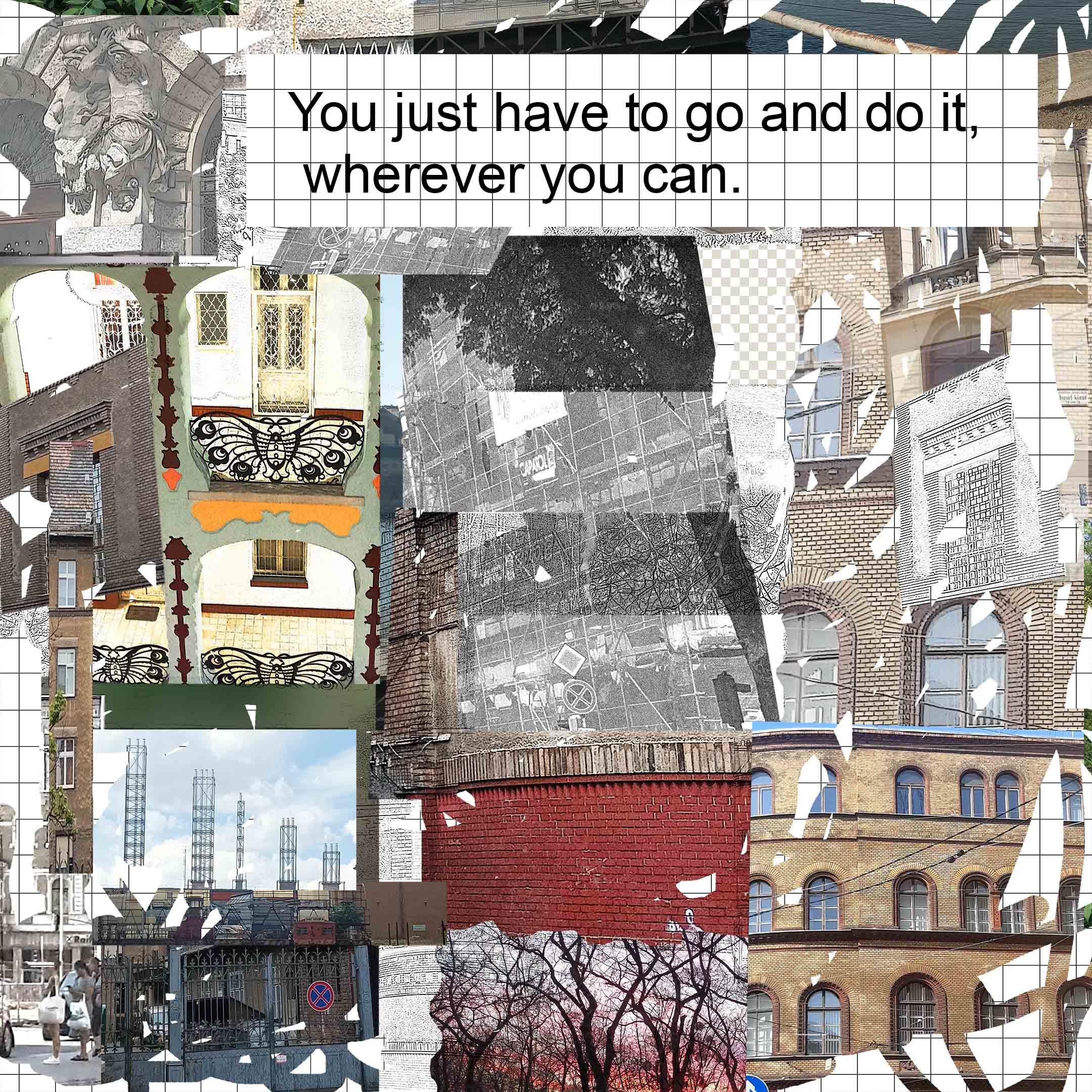DIY or Die: Budapest Beneath the Surface
Episode 11 of the TIMEZONES podcast series, co-initiated and co-produced by Norient and the Goethe-Institut. Conceived in the wake of Hungary’s latest parliamentary elections in April 2022 which reinforced the Orbán government’s grip on power for an unknown number of years, this episode aims to delve into the city’s independent (i.e. non-government funded) arts and music scene.
While the title of this episode (DIY or Die), alluding to the DIY aesthetics and bricolage methods of the punk scene, might sound rather succinct and harsh, these are the conditions the Budapest cultural scene mostly operates in. The podcast opens with Gáspár Miklós Tamás whom I visited in his centrally located Budapest apartment where I, irony of ironies, apparently sat in a chair the Hungarian prime minister used to sit in back when his political orientation was «slightly» different.
We then move on to Gólya, a space that hosts live music, DJ sets and workshops as well as several NGOs and media outlets operating in an increasingly hostile environment. It is the epitome of this DIY, community-, and collectively run philosophy. For the Buharov brothers, freedom and independence are indispensable. They gained international recognition despite being largely shunned by local arts funding. Their films draw you into an opulent, often absurdist and surrealist world whose protagonists are largely sourced from the Buharov brothers’ colorful array of artistic friends from various corners of the city’s underground scene. Ivan, one of the Buharov brothers, is featured in this podcast.
Last but not least, there is of course humor, something that hasn’t evaporated despite all the doom and gloom. MAGA1-like red caps with the white inscription «Eastern European Accent» are frequently spotted at various Budapest events. They can be traced to the band Exotic Girlfriend, whose lead singer Andi Soós is also a curator. I also meet Gábor Kovács aka Új Bála in his Buda flat and we conduct our interview surrounded by boxes and empty walls. Gábor is moving to Brussels in search of a better life and to pursue his musical activities. Many people are talking about leaving, exhausted and fed up with waiting for systemic change. Then again: «You just have to go and do it, wherever you can», says visual artist Lilla Lőrinc.
Credits
A podcast by Lucia Udvardyová, sound design by Máté Elod Janky
Co-initiated and co-produced by Norient and the Goethe-Institut
Featuring: Gáspár Miklós Tamás, Marci Bíró, Nándor Hevesi aka Ivan Buharov, Andi Soós, Gábor Kovács aka Új Bála, and Lilla Lőrinc
Artistic Editor: Abhishek Matur
Project Management: Hannes Liechti
Video Trailer: Emma Nzioka
Jingle Voiceover: Nana Akosua Hanson
Jingle Mix: Daniel Jakob
Mastering: Adi Flück, Centraldubs
Artwork: Šejma Fere
→ Full transcript of episode 11
Listen on



→ Listen to further TIMEZONES episodes
Featured Artists
Gáspár Miklós Tamás, known under his moniker TGM, is a Romanian-born, Budapest-based philosopher and public intellectual. He has contributed to a number of media such as Mérce and Open Democracy, where he primarily devoted himself to political and aesthetic questions. His books have been published in several languages, including English, French, and German.
Marci Bíró is a Budapest-based musician and cultural manager. He is one of the main forces behind the Gólya club (as he says in our interview, the space is of course run on an equitable basis, but still – you can’t take Marci out of Gólya, nor Gólya out of Marci). He has also been active in the community-run music hub Kripta. Besides cultural management, he is also a (hyper)active musician connected to several Budapest (punk) and other bands. When he’s not running around the spaces he runs, he can be found in a van touring Europe’s finest DIY spaces. Follow him on his website or on Bandcamp.
Nándor Hevesi aka Ivan Buharov is a Budapest-based filmmaker and musician. Together with Kornél Szilágyi, he established the artistic duo Igor and Ivan Buharov, active in the fields of film, performance, visual arts, and music. Their cinematic world is soaked in surrealism and magic, buoyed by the use of Super 8 and 16 mm cameras. Their latest film is called Land of Warm Waters. They also compose the pieces of experimental music that accompany their films. Follow him on his website.
Gábor Kovács is a Budapest/Brussels-based musician and visual artist as well as an alumni artist of the SHAPE platform. Active in a number of projects, he works with a wide range of genres and sounds, although his main output is Új Bála. Új Bála merges noise, psychedelia, and fringes of techno, summoning the rhythmic skeletons of dance music to bring order to his backdrop of mangled synth noises. In the past couple of years, Új Bála has released works on labels such as Plaque, Baba Vanga, Altered States Tapes, Czaszka Rec., Lost Dogs Entertainment, or Tanzprocesz and performed at various festivals, clubs, and DIY spaces across Europe. Follow Új Bála on Bandcamp, SoundCloud, Facebook, or Instagram.
Andi Soós is a curator, writer, and researcher based in Budapest. She is currently a PhD candidate in design culture studies at the Moholy-Nagy University of Art and Design. In 2018, she and Noémi Varga founded the band Exotic Girlfriend. Inspired by heartbreaks, transatlantic romances, and misunderstood text messages, the band reflects on the challenges and joys of being an Eastern European woman: combining lo-fi, indie-pop music with ironic lyrics that tell real stories from a female perspective. Follow her on her website, Spotify, Instagram, or YouTube.
Lilla Lőrinc is a visual artist and cultural worker based in Budapest, Hungary. With a longstanding presence in the Hungarian contemporary art scene as part of the artist duo Lőrinc Borsos and with strong ties to art quarter budapest, an independent art centre, she is interested in exploring the frontiers of interdisciplinarity, community-driven artistic approaches, and experience-centered event creation. Follow her on her website.
Bonus Talk
How Does a Power Plant Go on Working?
moderated by Krisztián Puskár
General political disillusionment and the shadow of financial crisis are a heavy burden in the 13th year of Viktor Orbán’s regime, causing general burnout and escapism not just in Hungarian society but in Budapest’s supposedly critical underground music and art scenes.
TIMEZONES Budapest’s producer Lucia Udvardyova, experimental/metal drummer Balázs Pándi and moderator Krisztián Puskár discuss how the rise of the state-funded «House of Music, Hungary» created a rift in the music community, how the system feeds on these conflicts, and how Udvardyova’s report about Hungary’s nationalist rock scene, made ten years ago, inspired her decision to revisit the acclaimed leftist philosopher in this episode made for Norient and the Goethe-Institut.
What are the limitations of talking about politics in art and everyday life? Is leaving the country a real alternative? Is the infrastructure of Budapest’s music underground prepared or equipped for the existential crisis that is approaching as we speak?
Balázs Pándi is a drummer and former promoter with roots and formative years in metal and punk music as well as many international collaborations in the experimental and improv jazz field, including projects with Merzbow, Keiji Haino, Mats Gustaffson, Thurston Moore, Attila Csihar, KK Null, Jim Jarmusch, etc. He also works as a journalist. Follow him on Instagram or Discogs.
Krisztián Puskár is a journalist, editor, media worker, organizer, curator of UH Fest, radio host at Punctum (Prague) and Lahmacun (Budapest), and occasional DJ. Follow him on Instagram.
Playlist
Explore a playlist with a selection of tracks from the city’s underground producers.
Curated by Lucia Udvardyová
Trailer
by Emma Nzioka
- 1. Make America Great Again.
The TIMEZONES podcast series plunges into the world of artists and their practices, asking: what does living and working in culture and the arts involve in different countries, cities, and contexts today? The artists’ thoughts on their moods, their social, political, and intellectual realities and their philosophies (of life) have been worked up into experimental audio collages.
The podcasts run the gamut of formats and content, from straight journalism to experimental and documentary approaches, ethnography and fiction, sound art, and improvisation. The TIMEZONES series endeavours to create new artistic forms of storytelling, listening and exchange across the boundaries of geography, time zones, genres, and practices.
The TIMEZONES podcast series is co-initiated and co-produced by Norient and the Goethe-Institut.
Biography
Biography
Shop



Published on September 29, 2022
Last updated on October 12, 2023
Topics
From political music in the GDR, the trouble of punk musicians in China and the dangerous life of kurdish folk singers in Turkey.
Can a bedroom producer change the world? How do artists operate in undersupplied conditions?
Special
Snap







